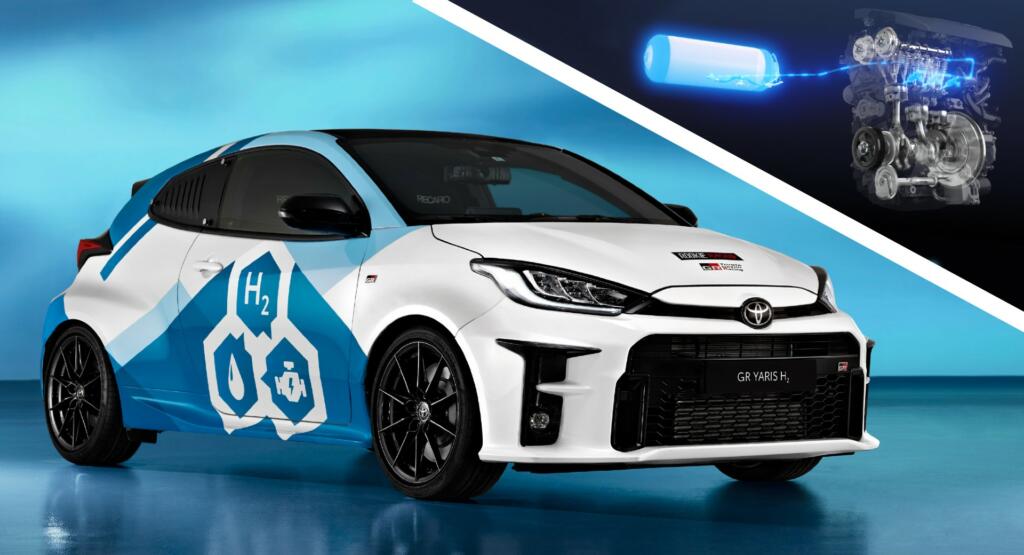While car manufacturers across the world hurry to develop their Electronic Vehicles, Toyota has veered off the conventional and commissioned Yamaha Motor to develop a hydrogen-fueled engine. Toyota wants Yamaha to develop a 5.0-litre V8 engine that is fueled entirely by hydrogen.
The unit in the development is based on the 5.0-litre engine in the Lexus RC F luxury sport coupe, with alterations made to its cylinder heads and injectors, among other things. According to Yamaha, the unit can deliver as much as 450 horsepower at 6,800 revolutions per minute.
It is being reported that Yamaha started working on this hydrogen V8 five years ago. Takeshi Yamada, who works in Yamaha’s R&D department was quoted as saying, “I started to see that engines using only hydrogen for fuel actually hadvery fun, easy-to-use performance characteristics. Hydrogen engines have an innately friendly feel that makes them easy to use even without resorting to electronic driving aid,”
Hydrogen fueled vehicles are the future
As reported extensively by TFI, the world is changing and crude oil is becoming expensive and environmentally unsustainable. The entire world agrees about one thing- if the human race doesn’t cut down on the consumption of fossil fuels, the stock of fossil fuels may get exhausted and global warming will turn into an irreversible disaster.
Presently, our cars and public transport consume way too much oil or natural gas and they also release toxins into the environment doing further damage to the climate change campaign. So, the world is looking at electric vehicles (EVs) as its solution. However, there is a far better solution- hydrogen-powered fuel cell vehicles (FCVs). Toyota has accessed it early and is pushing R&D in this technology.
An FCV is essentially a hybrid vehicle as they have trappings of both an electric vehicle and a conventional vehicle due to the use of electric energy and a fuel tank at the same time. Toyota and Yamaha take pride in having ‘Motor’ in their names and thus they want to develop a clean engine that still has ‘internal combustion’.
Yamaha Motor President Yoshihiro Hidaka appeared chuffed about the developments as he remarked, “Hydrogen engines house the potential to be carbon-neutral while keeping our passion for the internal combustion engine alive at the same time,”
Read more: Hydrogen fuel cars are the future and not electric cars
Advantages of a Hydrogen fuel tank
A hydrogen fuel tank can be filled in 5 to 10 minutes. On the other hand, even Tesla’s fast chargers with 120 kW give 80% battery in thirty minutes. Also, not everyone can own a Tesla and other electric automobiles might take even more time to charge.
Since we are on the subject of charging, we ought to understand that charging the EVs won’t be an easy task either. A huge infrastructure in the form of charging stations will have to be built in the country in order to make travelling by EV practicable in the first place.
Hydrogen FCVs, on the other hand, can rely upon the already existing pump stations network if and when the country is ready to transform its vehicles market.
Reliance is getting behind the Hydrogen future
India’s richest man Mukesh Ambani has already smelled the potential in the idea. As reported by TFI, Reliance industries are all set to become one of the prominent sellers of Hydrogen fuels. They will do it by bringing down the cost of Hydrogen fuels. The company has decided to re-purpose a synthesis gas plant for the production of blue Hydrogen.
Blue Hydrogen is simply a fossil fuel without carbon dioxide. When natural gas is split into hydrogen and CO2, it is blue hydrogen. The CO2 is captured and then stored. Though it is not the greenest form of Hydrogen fuel, its low cost of production is believed to be a stop-gap arrangement until the cost of producing cleaner hydrogen comes down.
Read More: Prepare to bid your fossil fuel goodbye! India is leading the blue Hydrogen race!
Developing countries like India and China still rely predominantly on coal-powered thermal energy, which isn’t really a clean source of electric energy. Transformation to wind energy and solar energy will still take some time. So, if you use coal-powered thermal plants to run EVs, it does not really save the environment and we only shift from one type of hydrocarbons to another type of hydrocarbons while driving our automobiles.
Hydrogen fuel cell vehicles, on the other hand, offer a more equitable and environment-friendly mode of travel. Hydrogen cars are therefore the real future and not electric cars.
True, hydrogen cars are still in the nascent stage of development whereas EVs are knocking at our doors. But once fully developed, hydrogen cars may get accepted as the better alternative.
